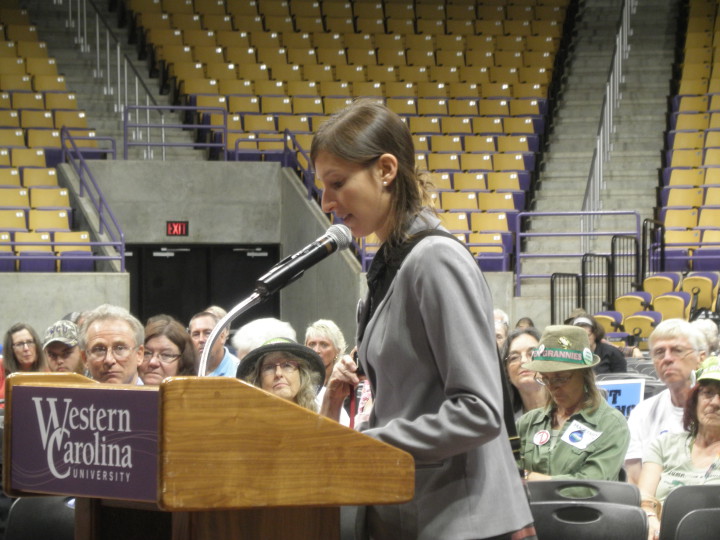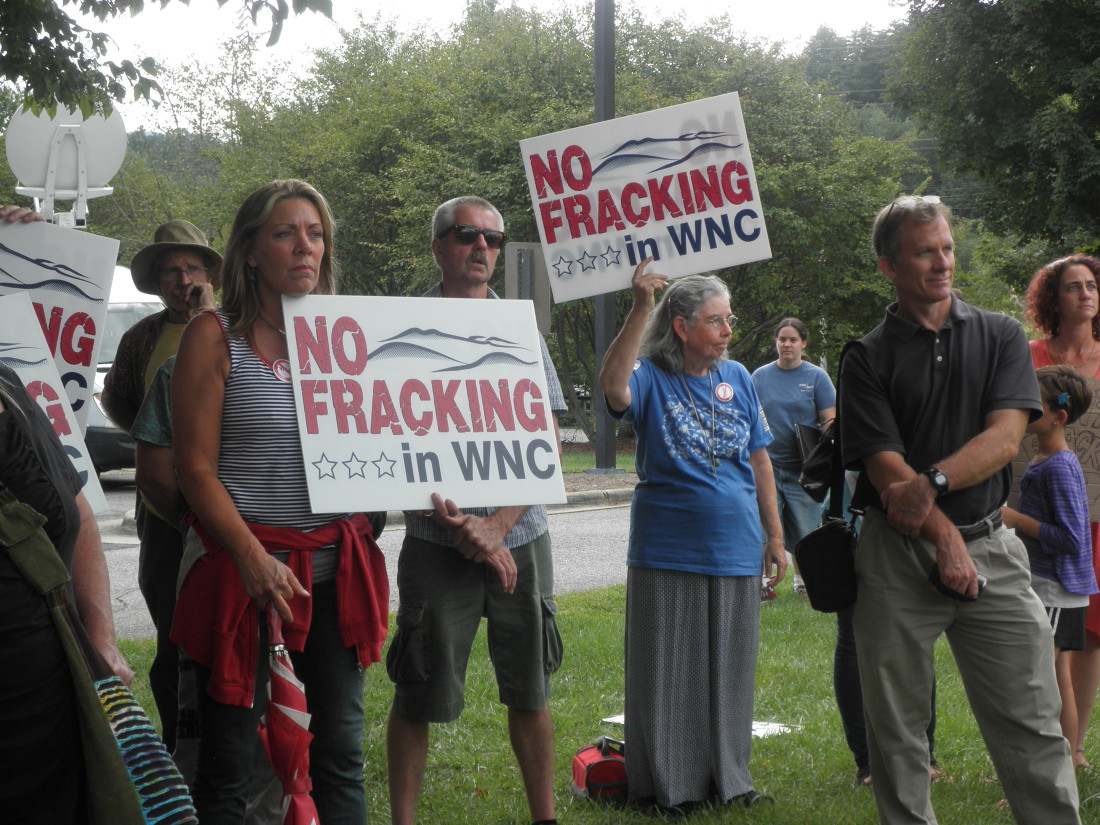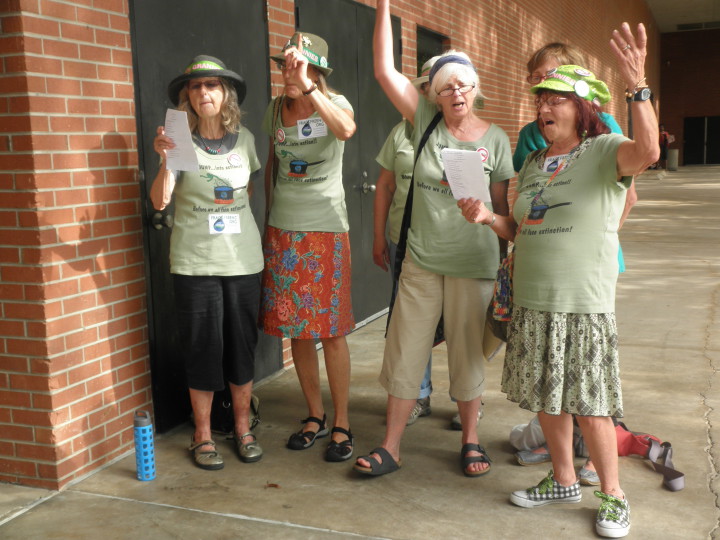Don’t allow fracking in Western North Carolina. That was the clear message from the nearly 90 people who spoke to members of the state Mining and Energy Commission on Sept. 12 in Cullowhee. They were voicing their concerns at the last of four public hearings on proposed rules for hydraulic fracturing, a drilling method that involves injecting water, sand, and chemicals under high pressure into shale formations to extract natural gas.
Earlier this year, N.C. legislators announced the end of a fracking moratorium, the beginning of studies of areas in the state that could hold natural gas in shale formations, and the possibility of fracking permits being approved in 2015. Parts of WNC made the list, with some shale formations in Jackson and Haywood counties, although the Sylva Herald reported recently that the state environmental agency and geologists have indicated that shale gas is unlikely to exist in the region in quantities that would make it profitable for companies to extract it.
Even with such news, more people showed up in Cullowhee — about 560 — than had in previous hearings in Raleigh, Reidsville, and Sanford, where turnout didn’t top 500.
In a pre-hearing press conference, Amy Adams, former supervisor for surface water protection at the N.C. Department of Environment and Natural Resources, said, “To get a visual of the significance of these rules, think of them as a giant dam. The rules are the wall holding back the potential harm of industry. The wall must be tall enough and strong enough to protect the communities downstream of the dam.” She added, “The rules need improvements in every one of the 14 areas. Not one section has the teeth or the backbone needed to protect our communities.”
Then for four straight hours, three members of the Mining and Energy Commission — Amy Pickle, Kenneth Taylor, and James Womack — heard what attendees had to say about reinstating the moratorium and strengthening the rules to protect the health and safety of the public.
Russell Johnson, talk-show host of “Political Alchemy” on Asheville FM, a community radio station, asked the crowd to stand when he had his turn at the microphone. “We’re all one people,” he said. “If we stand together we can make this change.” Addressing the commissioners, he said, “We’re asking you to make a moratorium so there will be no fracking activity in this state.”
Other speakers backed Johnson’s call for a moratorium and made suggestions for strengthening regulations for fracking — increased distances between the wells and occupied buildings and drinking-water sources, prevention of compulsory pooling (in which landowners can be forced to lease their land to fracking companies), public disclosure of the chemicals used, long-term groundwater monitoring after drilling, wastewater storage in enclosed tanks instead of open pits, and more.

Katie Hicks of Clean Water for North Carolina noted a rule that’s been missing: “Continuous air monitoring for fracking wells near occupied buildings must be required.”
Fred O’Connor, owner of a solar design company, asked for a show of hands for support of fracking. Not a single hand in the auditorium was raised. He then asked how many were in favor of clean renewable energy, and every hand in the crowd went up.
Madison County resident Peter Robbins argued that fracking creates unique risks in WNC, which has steep-slopes, a diverse ecosystem and an abundance of wildlife. He cited problems related to narrow roads not equipped for the possible 24-hour traffic drilling entails, a lack of cell-phone service in many areas that makes emergency response impossible, and the frequency of landslides. “I came to suggest one practical solution,” he said, “which is to include a provision that says: In WNC, because of the severe and unique risks and the very small likelihood of any economic gain, we won’t allow fracking at this time.”
Tom Hill, the Democrat running against Republican Mark Meadows in the 11th Congressional district, took a stand against fracking despite previous statements that he supports it and would back policies to make it safe. “I oppose fracking,” said Hill. “My opponent does not oppose fracking.” (Meadows didn’t attend the hearing; he was quoted in the Macon News as voicing support for fracking, “if [it] can be done in a safe way, and we are able to retain control of our own energy needs.”)
Hill claimed that the problem originated on the federal level with the Energy Policy Act of 2005, which was pushed by then-Vice President Dick Cheney. “It exempted fracking from the normal rules of the Environmental Protection Agency,” said Hill. “It was appropriately called … the Halliburton loophole. We can only stop this if we put people in Congress who will vote to repeal it.”
Sabrina DiCarlo, office manager at Smart Start of Buncombe County, a nonprofit early-childhood agency, echoed Hill’s sentiments. “The truth is,” said DiCarlo, “currently there is no safe way to frack. This can even be seen in the exemptions. Any industry that requires exemption from the Safe Drinking Water Act, the Clean Water Act and the Clean Air Act should be considered fundamentally unsafe.”
Di Carlo summed up the sentiment of the hearing by saying, “We all want jobs for ourselves and neighbors. And we all enjoy using energy every day. The difference is that we believe that there are cleaner and safer ways to get there and that fracking is not the answer.”
MEC is accepting written comments through Tuesday, Sept. 30, by email to oil&gas@NCDENR.gov or by mail to Mining and Energy Commission, Attn: Oil and Gas Program, 1612 Mail Service Center, Raleigh, NC 27669-1612.







Your statement that I made “previous statements that I support fracking” is not correct. In an interview some months ago a reporter from the Citizen-Times took down my statements about the environment correctly. However, his editor deleted some of my words and the deletion made it appear that I support the present form of fracking, which I have vigorously opposed throughout my campaign, as I have done with the Keystone XL project. I corrected the misstatement by a letter to the editor which the C-T published, and the reporter later called and apologized, stating that he was on vacation when the article was published. I have the published letter if you would like to see it. As for fracking in general, vertical fracking has been around since 1946 and I do not believe that any reasonable person opposes the 1946 version. It was only when Dick Cheney et al. pushed for laws to implement horizontal fracking, which causes earthquakes and uses poisons that will in time leach into our water supply, that we citizens took up arms. I would appreciate a retraction by you and would also appreciate source references when you attempt to quote me in the future, rather than shots from the hip.
Thank you for clarifying your position, Mr. Hill. My remarks about your position were based on your letter to the Asheville Citizen-Times, in which you said, “Fracking must be limited to environmentally-safe substances and procedures, and should not proceed where earthquakes may result.” You also stated, “What I do support is cleaning up messes left by these energy production methods” (nuclear and hydraulic fracturing), and “The energy companies should be required to pay for fracking damages…” These comments seem to indicate that you support fracking as long as it can be done in an environmentally safe and responsible way.
Susan,
The term fracking has come to denote “horizontal fracking”, which uses toxic substances and causes earthquakes. I have objected to this process throughout my campaign, and your bald statement in your article that I “previously supported ‘fracking’ ” is simply false, no matter how you may spin it. A responsible reporter would have said in your article that I have maintained that “fracking must be limited to environmentally-safe substances and procedures, and should not proceed where earthquakes may result”, and that I have further advocated requiring energy companies to pay for cleaning up their messes. Instead, you never placed any qualifiers on your statement, but rather led readers to believe that I had previously supported the current form of fracking and had flip-flopped on the issue. This was unfair and false. Your latest interpretation of my position is the same language that Mark Meadows is now using for his flip-flop. Mark voted just a few days ago to tie the hands of the EPA in defining clean water for its rule making process, which directly contradicts his claimed support of an “environmentally safe” approach. It is reminiscent of Dick Cheney’s success in removing fracking from the purview of the EPA under the “Halliburton Loophole” in the 2005 Energy Act. If you cannot see and report the hypocrisy in Mark’s latest spin effort and distinguish his position from mine, I cannot help you. But I do resent your fast and loose reporting on my position.
Mr. Hill, we do ask that all commenters remain respectful. With that in mind, please understand that our writer has thanked you for clarifying your position, noted where she got the initial information from, and acknowledged that you have said “fracking must be limited to environmentally-safe substances and procedures, and should not proceed where earthquakes may result.”
Mr. Hill,
As a voter registered in North Carolina, I’m very concerned by your response to this article. I read your comments to the Citizen-Times, and have reached the same conclusions as the reporter based on my own educated interpretation and knowledge of hydraulic fracturing. I’m more interested in hearing you explain your position in clear terms rather than reading your vitriolic comments about the reporter’s interpretation of your comments. Fracking, as understood by the public, is defined as the extraction of natural gas by means of injecting huge amounts of water and other substances into the ground under high pressure in order to fracture the rock. The direction of the well casing is irrelevant. The public is concerned more with the use of local water resources and hazardous chemicals in the process as well as the transportation of the gas and the disposal of the produced water rather than the direction that the drill bit travels. You do not clearly state that you are against this process in your comments to the Citizen-Times. Instead, you imply that you are in favor of fracking under certain circumstances. If you are really against hydraulic fracturing based on the technology and materials used in any direction of drill bit travel, just say it. If you were more clear on your position, this would not be an issue, and I think that you have squandered an important opportunity here to work with the reporter to clarify for us, the voters, that you do know what you stand for and that you do understand the technology and the impact on the environment.
Ron, I have spelled out my position very clearly for anyone who is willing to listen rather than arguing. Since you are “well educated” on the subject, you must know that vertical fracking without cocktails has been used since 1946 to extract gas and oil, and has not caused any serious problems. It is also used to increase well water production. It is only horizontal fracking which is causing the current problems. As for the “vitriol” comment, it was not you whose position was misquoted. After being called out on an error, many people recoil with a “poor little person” posture, as you have done. I will not argue this matter any further with you, but will recommend that you read more on the fracking issue, rather than sending out an all-inclusive condemnation. BTW, I vote too.
Fracking? NC’s geology doesn’t support it and Fracking Awesome
See complete articles at http://tarheelteaparty.org/?p=11490
The following is from Fracking Awesome.
Fracking can only occur where there are deep shale rock formations — and in North Carolina, that’s in just a few places. Spanning just a handful of counties in the central part of the state, the only areas of significant potential for natural gas extraction occupy less than 5 percent of North Carolina’s total land area, which, it should be noted, doesn’t include Buncombe or the other mountain counties: “The state says our mountain counties don’t hold enough natural gas to even continue testing, so for now, that takes fracking off the table,” reports WLOS. (For detailed information on where these basins exist, please read the U.S. Geological Survey’s “Hydrocarbon Source Rocks in the Deep River and Dan River Triassic Basins, North Carolina.”)
“Then for four straight hours”
Are we done now? Let’s get those permits issued.
This is on the Shale Yes promotion bungle. http://www.citizen-times.com/story/news/local/2014/09/15/energy-group-bus-homeless-support-fracking/15693253/?fb_comment_id=fbc_691294827626751_691555884267312_691555884267312
I saw a group of men with “Shale Yes” T-shirts sitting together at the hearing, but they did not address comments to the Commissioners and had apparently left before the unanimous show of hands for a moratorium on fracking. One speaker alleged that a “blue shirt” had attempted to assault him with an automobile before the hearing and said the incident had been reported to the police.